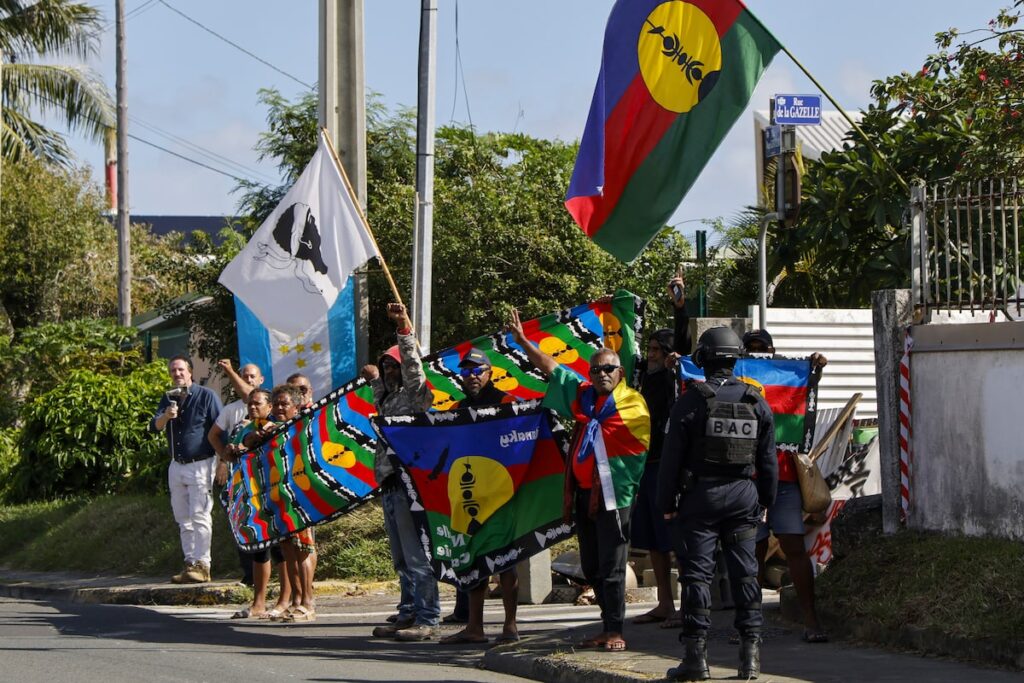Open this photo in gallery:
People demonstrate as French President Emmanuel Macron's motorcade passes in Noumea, New Caledonia, on May 23. Macron flew across the globe from Paris to arrive in violence-hit New Caledonia, a Pacific island nation hit by deadly unrest and whose indigenous people have long sought independence from France. Ludovic Marin/The Associated Press
When President Emmanuel Macron visited New Caledonia last year, he promised a bright future for the South Pacific territory, which has been French since 1853. New Caledonians had rejected independence in three successive referendums held between 2018 and 2021, and a confident Macron vowed a new chapter of reconciliation.
“New Caledonia is French because it chose to be French,” he told a crowd of 10,000 in the capital, Noumea, in a speech calling for “dialogue” with separatist leaders who boycotted the 2021 referendum. “To retreat again into silence, isolation or separatism is to choose to risk violence, today or tomorrow.”
New Caledonia is at the center of violence as the region becomes the hub of a geopolitical struggle pitting France against China and Russia.
President Macron landed in Nouméa again on Thursday, shortly after the region's worst riots in 40 years. Constitutional reforms proposed by his government to extend voting rights in local elections and upcoming referendums to more non-indigenous New Caledonians have sparked widespread rioting and looting since May 13, leaving at least six people dead. More than 1,000 French gendarmes have been deployed to restore calm and clear road blockades; another 2,000 have been promised.
But while the amendments passed by the French National Assembly and the Senate were the spark that lit the fire, prior interference in New Caledonian politics by pro-Russian and pro-Chinese factions created the conditions for the fire to spread: their campaign to stoke anti-French sentiment at a time when China is asserting its dominance in the Indo-Pacific and Russia is seeking to sow chaos.
New Caledonia, known in French as “La Nouvelle Calédonie,” has recently gained strategic importance due to its location just 1,500 km from Australia's east coast and its abundant nickel reserves, the fourth largest in the world. President Macron is keen to integrate New Caledonia's production into Europe's electric vehicle battery supply chain. However, nearly 40% of New Caledonia's current nickel exports go to China, which dominates the global electric vehicle battery market.
What's happening in France's Pacific base in New Caledonia, where violent riots flare up
Nickel prices have been falling sharply since 2022 after output from Indonesia, the world's top producer, tripled. Falling prices have hit New Caledonia's economy hard, and Swiss-based mining giant Glencore announced plans this year to sell the country's nickel mines. Still, global nickel demand is expected to grow rapidly through 2030, and the prospect of China filling the void left by Glencore is unsettling Paris and Washington.
Indeed, in a speech in Noumea last year, Macron criticised separatist leaders who suggested that independence for New Caledonia would benefit from closer ties with China: “If independence means choosing to go to war with China tomorrow, then [naval] “Good luck having a base here or being dependent on other fleets! That's not called independence,” he said at the time.
In recent years, Beijing has nurtured ties with the Kanaks, a coalition of New Caledonian independence activists. New Caledonia's indigenous people, known as Kanaks, make up about 41 percent of the territory's population of 270,000. The separatist group has had closer ties with Moscow since the Soviet era.
France's political and military support for Armenia in its long-running conflict with Azerbaijan over Nagorno-Karabakh has also made Armenia a target of the pro-Russian Azerbaijani government. France has accused Azerbaijan of stoking anti-colonial sentiment in New Caledonia and other French overseas territories. Social media posts this month showed rioters in New Caledonia waving Azerbaijani flags, leading France to ban TikTok in the territory. French authorities this week linked an “unprecedented” cyber attack in New Caledonia to Russian IP addresses.
Whether or not Russia was directly involved in the unrest in New Caledonia, Russian President Vladimir Putin is unlikely to be unhappy with his French counterpart's recent troubles. Putin is still upset that Macron didn't rule out sending French troops to Ukraine earlier this year, a stance he reiterated earlier this month. Russia has been waging a massive disinformation campaign in former French colonies in Africa, and after recent coups, French troops were expelled from Mali, Burkina Faso and Niger. They have been replaced by Russian mercenaries.
Just weeks before the opening of the Paris Olympics, President Macron is facing a major political crisis: Plans for the Olympic torch to pass through New Caledonia next month have been halted, and the new chapter that the French president had hoped to begin there now looks set to end very badly.



